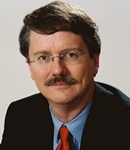It’s not often that I wake up to hear the name of someone I know well on all the morning news programmes, but it happened last month with President Obama’s nomination of Jim Yong Kim to become the next president of the World Bank. Last week, the Bank confirmed Jim Kim as its new president, to replace Robert Zoellick.
I met Jim when we both served on the steering committee of the Joint Learning Initiative on Children and AIDS from 2006 to 2009, and I think his nomination to lead the World Bank is a brilliant choice.
The Joint Learning Initiative was brought together because hundreds of millions of dollars were being raised to help children affected by AIDS, but there had never been a rigorous review of what programs and actions were most helpful. Its steering committee involved people of very high calibre from Harvard, UNICEF and the governments of the UK, Ireland and the Netherlands among others. At the time, I was the executive director of the Bernard van Leer Foundation in the Netherlands, which provided a lot of the initial seed funding for the Joint Learning Initiative.
Jim came to the Joint Learning Initiative with an already long record of achievement. Trained as both an anthropologist and a medical doctor, he was one of the founders of the health-focused non-profit Partners in Health, along with Dr Paul Farmer. Jim had successfully taken on multi-drug resistant tuberculosis in the slums of Lima, as described in Tracy Kidder’s book Mountains beyond Mountains. He had served with the World Health Organization as the head of its HIV/AIDS department, and pushed, in the face of considerable apathy and opposition, the introduction of antiretrovirals (ARVs) in Africa. The plan was called ‘Three by Five’, with the objective of getting three million people on ARVs by 2005. Before Three by Five, many were resigned to AIDS being a death sentence in Africa, while it had been limited to being a chronic disease in the US and Europe for 15 years. Jim’s drive and persuasiveness were crucial in changing that reality, and millions of adults and children are alive in Africa today in part because of his efforts. Since 2009, he has served, with equal distinction, as the President of Dartmouth University in the United States.
What might Jim Kim’s tenure at the World Bank mean for relations between the Bank and philanthropy? Here are a few hunches:
- Jim has long experience of civil society. More than previous presidents of the Bank, he will understand the power of grassroots approaches, and the importance of getting the ‘handshake’ right between government and civil society.
- Jim will have a strong grasp of the potential role of foundations as actors in global development – the combination of long-term commitment, short-term dynamism, and flexible resources. I predict he will welcome partnerships with foundations, but he will expect them to deliver.
- Jim has in the past articulated on ‘implementation failure’ as the major reason that global development has not progressed more quickly – not a lack of strategy, not even of resources, but rather a lack of attention to making processes and systems work as they should. A renewed emphasis at the Bank on ‘making development work’ would create opportunities for collaboration between governments, foundations, NGOs and individual citizens.
- Jim can be a bulldog for what he believes in. He helped the WHO reach a new level of effectiveness in AIDS treatment in Africa, through drive and energy and conviction. I would expect him to apply the same demanding but inspirational style to leadership within the Bank.
There will be a lot on the plate of the new president of the World Bank: a daunting range of ‘global commons’ issues, the rise of middle-income countries, the need to keep relevant in a rapidly changing world. My expectation is that Jim Yong Kim will bring an exceptional level of creativity and energy to these challenges, and that the Bank will thrive under his leadership.
Peter Laugharn is the executive director of the Firelight Foundation




Comments (0)